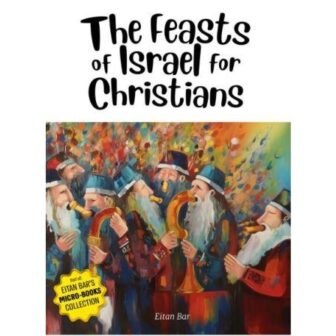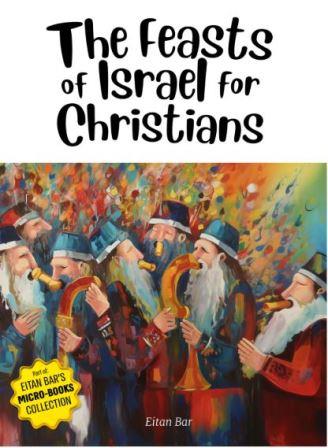I was intrigued by this little book when I saw it on Amazon. Relatively short, it is only 40 pages long and part of what the author calls his “Micro Books Collection.” So often a quick overview, maybe even of something you just have a passing curiosity about, will trigger the desire to find out more. This Micro Book about the Feasts of Israel for Christians can do just that.
The Feasts of Israel for Christians
Dr. Eitan Bar
August 6, 2023
Let me say up front that this book is written from a theological position that I do not hold, and you might not either. That does not mean it doesn’t serve a purpose. The title identifies the audience: The Feasts of Israel for Christians. If that is you, or if you are sharing with someone who fits that description, this small book could serve as an easy introduction to the Biblical Feasts. If you do not consider yourself a typical mainstream Christian, then it might not be for you. Just be aware of the intended audience as you read it.
Summary
The purpose of this book is to serve as a guide for the Christian community in understanding and celebrating the major Jewish festivals in the Old Testament of the Bible.
First line of the Introduction to The Feasts of Israel for Christians
After an introduction and brief overview, there is a chapter dedicated to each of the Feasts. Following the common Messianic understanding and the outline of Leviticus 23, there are seven of them.
- Passover
- Unleavened Bread
- First Fruits
- Weeks/Pentecost
- Trumpets
- Atonement
- Tabernacles
In addition to these, the author adds a chapter summarizing three other Jewish observances: Hanukkah, Purim, and Tisha B’Av. Finally, there is a chapter covering the Sabbath.
Of course these three to four page chapters are not intended to be exhaustive. They are well organized, very concise summaries for Christians unfamiliar with the subject to understand the Festivals and their Jewish history. Yet, Dr. Bar also presents something not just for the Christian but also the Jewish reader who might be curious enough to pick this up. He ties Jesus/Yeshua to every Feast.
In each chapter, Dr. Bar presents an overview of the festival from his view, that of a Jewish Christian. He discusses Jewish history and traditional practices, and sometimes brings in stories from the Gospels. Finally every short chapter has a section with the heading “In Jesus” in which he explains the significance of the Feast to the Christian faith.
Author’s Approach and Perspective
Though the title of the book refers to “Feasts of Israel,” throughout the book Dr. Bar calls them “Jewish Feasts.” It’s a subtle distinction and widely used. Dr. Bar is, himself, a Jewish believer in Jesus. And while calling them “Jewish Feasts” bothers me, it’s a term commonly understood by Christian readers being introduced to these celebrations. They have used it themselves.
Dr. Bar makes a very clear distinction between the Jewish faith and the Christian faith. He isn’t completely wrong in doing so, but in the process he writes with the notion that these are, literally, Jewish Feasts for the Jewish people. Christians, he says, can benefit from understanding them and even participating in them, but they aren’t necessary for New Testament believers. And as someone who believes there is just one Torah for all, that is unsettling. God said to observe them, so I do.
His writing style is straightforward and easy to read. Even someone who is unfamiliar with the Biblical Feasts will not struggle to follow his thoughts. Dr. Bar is obviously well studied yet does not encumber the reader with a lot of deep theological reasoning or heavy language. Again, it is a simple and short book ideal for the casual reader.
A Few Things To Consider
In the section on Passover, the author states that participation can offer Christians a “tangible connection to their faith’s Jewish roots, enriching their understanding of key Christian doctrines and practices.” He compares it to the “Eucharist or Communion sacrament.” And regarding the Feast of Unleavened Bread, he states it “invites introspection and spiritual purification akin to the Lenten period.” Dr. Bar uses commonly accepted Christian tradition to help those who practice them to see the same type of thing in the Feasts.
Yet regarding the Festival of First Fruits, the author says that the “morrow after the Sabbath” refers to the first day of the week. Notably this is not traditional Jewish practice, though most in the Hebrew Roots community would agree with him. Jewish congregations, including many Messianic Jewish congregations, view the “morrow after the Sabbath” as the day following the High (first) Sabbath of the Feast of Unleavened Bread.
Then in the section on the Feast of Weeks, in which he seems to consider Pentecost a Christian celebration of the birth of the Church and different from Shavuot, there is reference to the Holy Spirit is an “essential facet” of the triune God. He recalls a number of other Christian concepts and doctrines, a few of which are highly debated in Messianic and Hebrew Roots circles.
Of major concern to me is the author’s acceptance of the Roman Catholic teaching on the Sabbath, which has been handed down to protestant denominations – the idea that the concept of Sabbath has been transferred to Sunday as the “Christian Sabbath.”
“In Christian tradition, the concept of Sabbath has been transferred to Sunday, the first day of the week, in celebration of Christ’s resurrection.”
from The Sabbath in The Feasts of Israel for Christians
He follows this with statements such as “He becomes our Sabbath rest” and “He is our Sabbath.” The idea that this does away with observing the seventh day Sabbath runs counter to one of the most essential things we stand for in the Hebrew Roots community.
Recommendation
For the reasons stated above, I cannot recommend this small book to anyone who is serious about returning to the ancient paths and walking in the Torah of our Creator.
But understand, this book is not written to us. It is written to the mainstream Christian, and just might spark an interest in studying further. And it could also challenge the Jewish reader who may never have heard that these Feasts point to the Messiah. In the next to the last paragraph of the book the author states:
From a Jewish perspective, my aspiration is for this work to be an evangelistic tool, shedding light on how the festivals, in fact, point to Yeshua, our Messiah.
from the last page of The Feasts of Israel for Christians
I would agree. Though this book is written to Christians, it could be read by a Jewish person without them feeling as though they were being preached to. It would not leave a Jewish person feeling as if a Christian has encroached on something that is “theirs,” yet still introduces them to the prophecies concerning Messiah Yeshua.
As for the Christian reader, Dr. Bar notably does not attack or even mention the big Christian holidays of Christmas and Easter. Christians reading this book as an introduction to Biblical Feasts will should not feel as if their faith and practices are being undermined. Those kind of changes, I believe, come as one grows in learning the Ancient Paths (Acts 15:21).
About the Author
This is from the Amazon author’s page:
Dr. Eitan Bar (born 1984, Tel Aviv) is a Bible scholar, author, and Israeli-Jewish follower of Jesus with multiple advanced degrees in Bible and theology. His unique background—living in Israel, being a native Hebrew speaker, and possessing advanced Christian education—provides a fresh and timely perspective on Christian beliefs and doctrines.
What I found most interesting and encouraging is that Dr. Bar, educated at Dallas Theological Seminary, has renounced the Calvinistic/Baptist theology that he says permeates the Messianic Movement in Israel. Kudos! As many of us have experienced, such a thing can be very difficult. His faith in Yeshua is strong and we should uplift and support those willing to make a stand for the truth.
You can gain more insight into Dr. Bar’s life and ministry at his website, www.eitan.bar.
Dr. Bar is probably best known for his book Refuting Rabbinic Objections to Christianity & Messianic Prophecies. This “Micro Book” is part of another series, some titles of which are not yet released. Just the titles of some of these immediately grab my attention! See what you think.
- Spiritual Nuggets: 30 Devotions Filled with Grace and Hope for the Weary and Hurting (May 2023)
- The Feasts of Israel for Christians: A Brief Overview of Israel’s Festivals in the Hebrew Scriptures and Their Relevance to Christianity (August 2023)
- Left Behind Deconstructed: Why I Left Pre-Tribulation Rapture Behind (September 2023)
- Free Will and Christianity: You or God—Who’s Really Buying This Book? (January 2024)
- Hellfire Deconstructed: An In-Depth Study of the Bible Verses About Hell (January 2025)
- The Secrets of the Kingdom: Mystical Beliefs in the Time of Jesus (July 2025)
This particular book may not reflect your understanding (as it does not reflect mine). However, it can be helpful with introducing Biblical Feasts to mainstream Christians as well as subtly introducing Messiah Yeshua to the unbelieving Jewish reader.



The Jewish feast all pointed to Jesus and when he died on the cross those feasts pointing to him were no longer needed. He had fulfilled them which is why Paul speaks of them being nailed to the cross. Many people think the Sabbath of creation was nailed there too but that verse is referring to their ceremonial sabbaths not the Sabbath made for man at creation.
Thanks for your comment. Not all of the Feasts have reached their fulfillment. Also, there is nothing from Paul speaking of these Feasts being “nailed to the cross” or “no longer needed.”